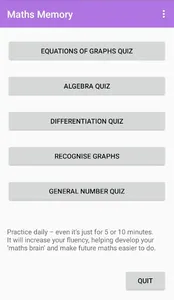This App was created by Helen McHattie & Dr Michael Cross. Inspired by research that supports regular practice of vital skills in order to gain mathematical fluency and improve long term performance. The improvement can be achieved with the use of mobile devices (Lindemann and Fischer 2013) and also closely links to our Executive Function skills (Cragg and Gilmore 2014).
We developed the App for students at the University of Bradford to help them to practice the material they should already be familiar with. We hope that they will practice daily until these concepts become natural to them so that they can then concentrate on solving problems using these skills and/or learning the new material needed for their course. Currently, we see students who are spending so much effort ‘working out’ the stuff they should already know they are distracted from the task at hand (Cross and McHattie 2016).
The App doesn’t differentiate between “factual (e.g. 6+4=10), conceptual (e.g. knowing that addition is the inverse of subtraction) and procedural (e.g. ′carrying′ when adding above 10) knowledge” (Cragg and Gilmore 2014) because, while it may be that different brain processes come into play, they are all required elements that one must practice in order to gain mathematical fluency.
Cragg, L., & Gilmore, C. (2014). Skills underlying mathematics: The role of executive function in the development of mathematics proficiency. Trends in Neuroscience and Education, 3(2), 63-68. Available from: [Accessed 18 September 2018].
Cross, M. A and McHattie, H. L. (2016) Increasing the focus on conceptual understanding to help students improve their long-term mathematics skills. In: Proceedings of the CETL-MSOR 2016 Conference, 6th-7th September, Loughborough University [Online], pp. 24-28. Available from: [Accessed 15 July 2017].
Lindemann, O. & Fischer, MH. (2013) Learning Effects of Arithmetic Problem Solving while Unlocking a Mobile Phone. Tech Rep. Available from: [Accessed 12 April 2016].
We developed the App for students at the University of Bradford to help them to practice the material they should already be familiar with. We hope that they will practice daily until these concepts become natural to them so that they can then concentrate on solving problems using these skills and/or learning the new material needed for their course. Currently, we see students who are spending so much effort ‘working out’ the stuff they should already know they are distracted from the task at hand (Cross and McHattie 2016).
The App doesn’t differentiate between “factual (e.g. 6+4=10), conceptual (e.g. knowing that addition is the inverse of subtraction) and procedural (e.g. ′carrying′ when adding above 10) knowledge” (Cragg and Gilmore 2014) because, while it may be that different brain processes come into play, they are all required elements that one must practice in order to gain mathematical fluency.
Cragg, L., & Gilmore, C. (2014). Skills underlying mathematics: The role of executive function in the development of mathematics proficiency. Trends in Neuroscience and Education, 3(2), 63-68. Available from: [Accessed 18 September 2018].
Cross, M. A and McHattie, H. L. (2016) Increasing the focus on conceptual understanding to help students improve their long-term mathematics skills. In: Proceedings of the CETL-MSOR 2016 Conference, 6th-7th September, Loughborough University [Online], pp. 24-28. Available from: [Accessed 15 July 2017].
Lindemann, O. & Fischer, MH. (2013) Learning Effects of Arithmetic Problem Solving while Unlocking a Mobile Phone. Tech Rep. Available from: [Accessed 12 April 2016].
Show More







